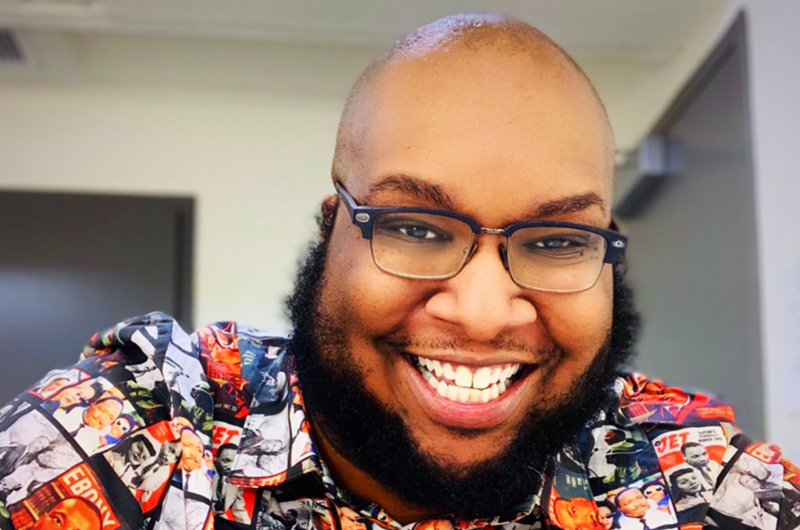Rev. Derek Terry is hosting an online learning and community session tonight — Wednesday, June 17 — titled "Race, Rage & Fear: Understanding Bigotry, Racism & Complicity."
Terry, the head pastor of St. Peter's United Church of Christ in Pleasant Ridge, is an openly gay Black clergyman who preaches and lectures about courageous living, spirituality, civil rights, race and social justice.
This latest event is just one of a series of conversations Terry and the church are hosting. (See more at facebook.com/stpeterscinci.)
The digital event, which takes place 6:30-8 p.m., features 50 free tickets and 50 tickets available for a $7 suggested donation. Each attendee must register individually, unless you are zooming from the same device.
We emailed with Terry to learn more about his "Race, Rage & Fear" series and why these conversations are so important to have right now.
CityBeat: Tonight's "Race, Rage & Fear" is just one of a series of events you have hosted. Can you explain why you launched this series? And when it began?
Rev. Derek Terry: I launched this series in 2016 after the presidential election. I was trying to figure out how this president won on a platform that I and others experienced as hate, identity-ism, transphobic, sexist, and racist. Now, I'm not saying everyone who supported Trump is all of these things. The more I talked to people in the community, the more I had to use Obama to explain why I think Trump was elected. Many thought that the election of Obama proved that we were in a post-racial society, but the election of Trump proved we are not.
Racism is alive and well, and it is written into our systems and many well-intentioned people support it every day. I started this series to educate people on what racism is, to help them understand how they may unconsciously support it, and how we can all work together to dismantle and destroy it. My church is completely diverse: Black/white, gay/straight, Democrat/Republican, young/older, very progressive/conservative.
I also specifically wanted to help white people who were trying to join the antiracist fight. Many Black people do not believe that it is their job to educate white people. I'm a spiritual leader, half of my church is white, some of the people I know who are doing the most anti-racism work are white, and I see it as my calling to help white people in this movement. This is not a Black problem, it is an American problem and we will all have to work to fix it. Our programs are a safe place for white people to get it wrong. They don't have to fear saying the wrong thing or being called a racist for not understanding.
CB: What can attendees expect from tonight's event?
DT: The truth. Racism is real. It is systemic. It is poison and it hurts those who are on the receiving end as well as those administering it — when you handle poison you always get a little on you and it diminishes you in the process. We seek to push people's thinking beyond their comfort zone so that they may consider experiences that are not their own. We will also give them information, language, and action steps to begin their own anti-racism work.
CB: Why are these conversations important, especially now, as those who may not previously have been involved work toward achieving racial equity and educating themselves as allies?
DT: For 401 years, Black people have been saying "you're on our necks" and for 401 years we were called lazy, crazy, liars, playing the race card, welfare queens, thugs, and the like. Now we have video and people have seen what COVID-19 did to the black community. Now the pattern and visual database points to ‘what’s beeeeeeeen going on’.
CB: Could you briefly explain for readers the difference between the concept of equality and equity?
DT: We want both equality and equity. Equality says that we all get the same level of support from society. So, when George Zimmerman kills a Black, unarmed 17-year-old Trayvon Martin — Trayvon's family gets the exact same justice for him that a white family would get if their white unarmed son was killed by a grown Black man. It means Tamir Rice would have been treated the same by the police as his white counterpart — and he would still be alive.
What equity says is, after 401 years of treating Black people unfairly, we as a people are starting behind in the race. Social equality may not be enough. You give me the same help as my white counterpart and it disproportionately advantages them because I've been disproportionately disadvantaged for 401 years. So giving me a $10,000 of help goes only so far because I don't have generations of wealth like my white counterpart.
My grandfather came back to America from Korea and was only allowed to buy a house in certain Black neighborhoods. Now his house is worth $60,000 and his white counterpart spent the same amount on a house in a white neighborhood 60 years ago and that house is worth $220,000 today. So, when my grandfather passes down his house, the impact is much different simply because of racist housing policies 60 years ago. Equity would take into account these issues and seek to give more because more was taken!
CB: Will a link be available to view the workshop later?
DT: Yes, it will be available on our Facebook page 2-3 weeks after:facebook.com/StPetersCinci.


